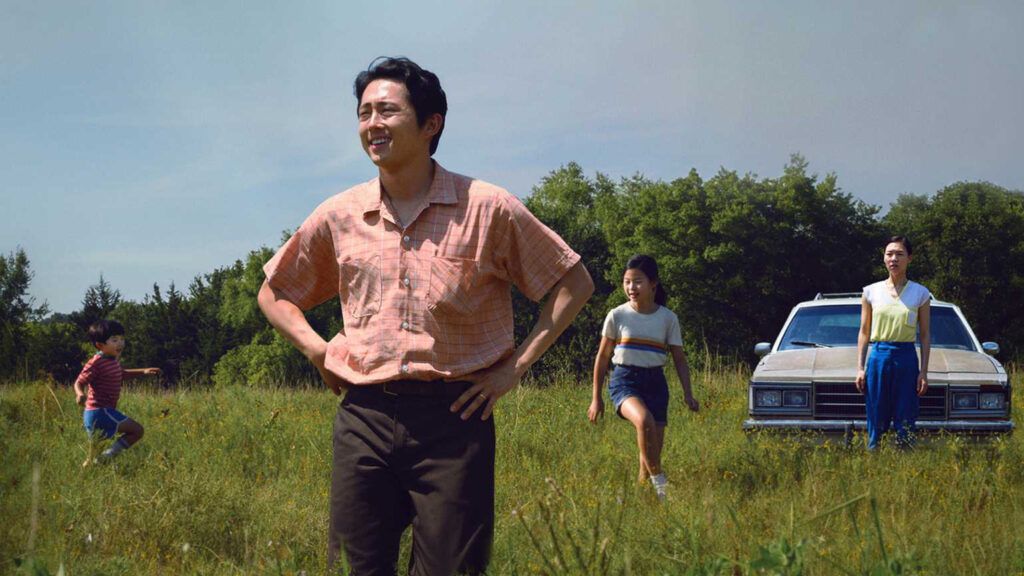A family drives through the Arkansas countryside. They arrive at their new home–a trailer on a large farm property. The children are excited. The mother is unsure. The father has a plan. So begins the incredible story of Minari, an intimate portrait of one Korean-American family’s search for the American Dream.
When director and screenwriter Lee Isaac Chung sat down to write this story, he began in the most logical place: his memories. “I decided to spend an afternoon writing down all the memories that I could,” Chung said in a recent interview. “I remembered what it was like to be 6 years old. So I started to write everything down.”
One particularly poignant memory: Chung recalled being afraid of a tornado hitting his family’s trailer home. They had only moved in a week or two before and didn’t know where to go.
“That struck me as an interesting way to start a movie,” Chung says. “I wanted to create an environment of what it actually was like to grow up in that place.” This was important for Chung, because while Minari is technically a fictional story, it is loosely based on his life. The son of Korean immigrants, Chung grew up on a farm in Lincoln, Arkansas.
The film follows the Yi family. The father, Jacob, played by Steven Yeun, purchased the land in the hopes of starting a prosperous farm. The mother, Monica (Yeri Han), is apprehensive about the farm and her husband’s decision to suddenly transport their family to an unknown environment. Meanwhile their kids Anne and David (Noel Kate Cho and Alan Kim) are just trying to fit into their new community. This is only made harder when their foul-mouthed, but kind-hearted grandmother, Soon-ja (Yuh-jung Yuon), arrives from Korea to help care for them. With only the help of an eccentric neighbor named Paul (Will Patton), Jacob sets out to build a paradise for himself and his family.
“To push [this story] out into the world and to share it with people, I’ve been astounded that so many are going along for the ride.” Chung says. “And that’s spoken to me a lot about the shared humanity that we have. I got to see how we share a lot of the same experiences.”
A film about a Korean-American family starting a farm in rural Arkansas is such a specific story. Yet the universality of the Yi family’s experience has moved people from different backgrounds across the country. The audience relates to the family’s joys and struggles, from sharing meals to money problems, from deep love to divorce.
“I think the reaction comes from the fact that people’s lives resemble one another. We all go through the same things,” says Yeri Han, who plays Monica in the film. “Even in the most painful moments in this film, you see this family overcome the struggles with so much love and strength; and I think that’s perhaps why this film resonated with a U.S. audience so much.”
Minari garnered a lot of Oscar buzz. It was nominated for Best Picture, Best Director, Best Original Screenplay, Best Original Score, Best Actor (Steven Yeun), and Best Supporting Actress (Yuh-jung Yuon). Youn won the Oscar for Best Supporting Actress, the first ever Korean acting winner in Oscar history! Minari also won the Golden Globe for Foreign Langaueg Film and the U.S. Grand Jury Prize at the Sundance Film Festival.
The overwhelming response to Minari comes from its focus on the power of family – especially during a time when so many of us are separated from one another due to the Covid-19 pandemic. But more than family, this film also has a lot to show us about the importance of faith.
Faith is vital to the Yi family. They teach their children the importance and power of prayer; they attend church to connect with their community. Jacob and Paul try to understand their different ways of showing their faith. Yet even in their differences, there are similarities. It is through faith in God – and in one another – that they can build a new life together. A “garden” as Jacob often calls it. Paradise for him and his family. Happiness.
While this hope is universal to all of us, it’s important to also see Minari as a specific portrait of the Korean American experience. Through this film, Chung and the actors sought to share his feelings about the American Dream and what that dream means for immigrants and their family. The good and the bad.
“A Korean-American existence – and perhaps an immigrant existence, especially when you are second generation – holds within it a deep isolation,” says Steven Yeun, who plays Jacob. “The most difficult part of making this film was balancing the Korean way of doing things and the American way of doing things, and in this one specific sliver of a story we are telling, maintaining its own truth.”
And that is the strongest part of Minari: it’s truth. It is unwavering in its mission to teach us something through its story. Whether we learn something new about what it means to be a family, how our differences in faith don’t have to separate us, or what the American Dream can look like to different people, this film has the power to speak to all of us.
You can watch Minari in the A24 virtual screening room here.
For more inspiring stories, subscribe to Guideposts magazine.






